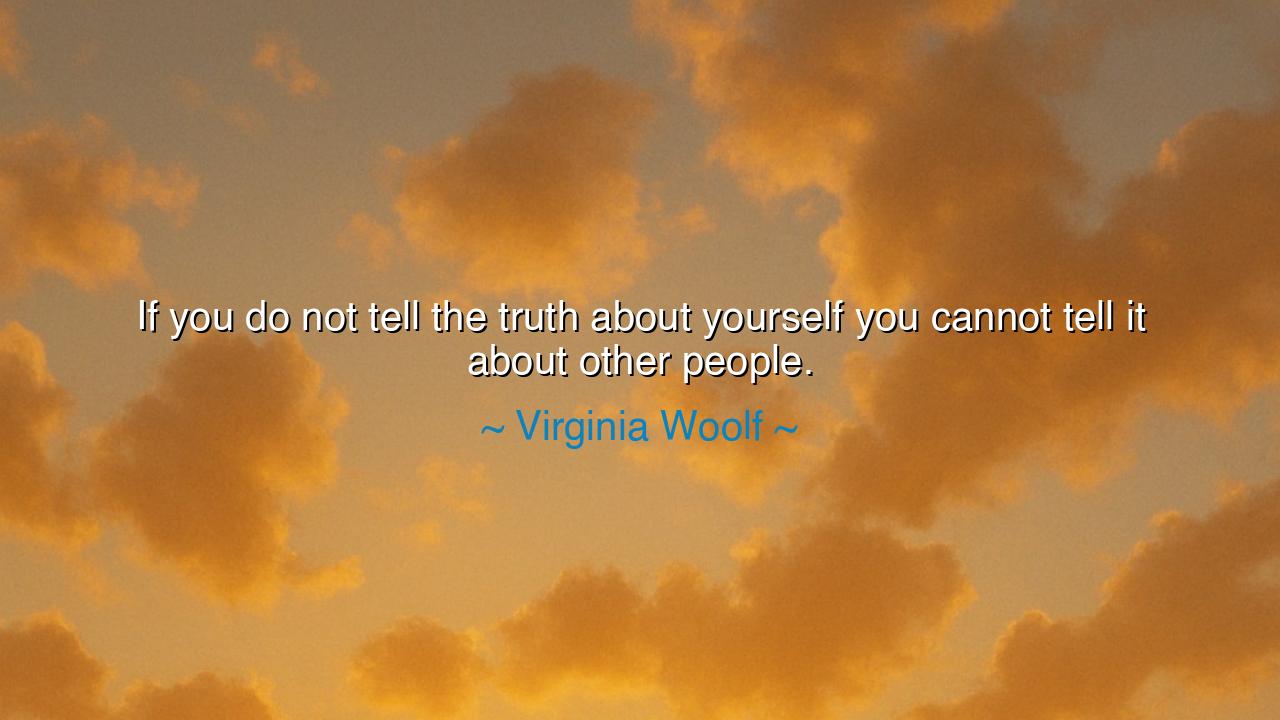
If you do not tell the truth about yourself you cannot tell it






Hear the voice of Virginia Woolf, a seer of the inner world, who declared: “If you do not tell the truth about yourself you cannot tell it about other people.” In this saying is unveiled a law as ancient as the oracles: the one who is blind to himself cannot see clearly into the hearts of others. For how can a mirror reflect another’s face if it is clouded by dust? To speak truth outwardly, one must first wrestle with the hidden chambers of one’s own being.
The meaning is sharp, yet tender: self-deception breeds falsehood, while self-honesty births clarity. The ancients taught, “Know thyself,” inscribed at the temple of Apollo at Delphi. Woolf echoes this commandment, but with a fiercer edge—she tells us that truth is not a possession but a current. If you dam it within yourself, it will not flow to others. But if you open the channel by confessing your own shadows, then your words about others will ring with authenticity.
History bears witness to this teaching. Consider Leo Tolstoy, who in his early life lived with contradiction—preaching virtue while drowning in vice. Only when he confronted his own hypocrisy, when he stripped away the lies he told himself, could he write Confession and later Resurrection. His art became honest, and because it was honest about himself, it became piercingly true about humanity. Woolf’s warning is clear: those who evade the truth of their own soul cannot hope to reveal the truth of another’s.
There is also danger in the opposite path—those who speak endlessly of others’ flaws without first examining their own. They become as the Pharisees whom Christ rebuked, who strained at gnats but swallowed camels. Their words, though loud, lacked the resonance of truth, because their hearts were closed to self-examination. Woolf reminds us that the fountain of truth is inward: if it is poisoned there, it will flow outward poisoned as well.
Yet this is not a call to despair but to courage. To tell the truth about yourself is no small thing—it is heroic. It requires one to stand naked before conscience, to acknowledge weakness, contradiction, longing, and wound. But in this act of bravery, the voice becomes strong, unshakable. The writer who admits their fear can write honestly of courage; the lover who admits their failings can speak truly of love; the leader who admits their limits can guide others with wisdom.
Think of Abraham Lincoln, who bore the scars of depression and self-doubt. He did not hide them from himself, but wrestled with them openly. Because he faced his own frailty, he could speak words of uncommon compassion about the suffering of a nation. His truth about himself became the seed of truth about others. His leadership was forged not from denial, but from radical honesty.
Thus, children of tomorrow, take heed: before judging the world, judge yourself. Before unveiling the truth of others, strip away your own veils. This is not self-obsession but the necessary path to integrity. The one who dares to look inward without flinching becomes a trustworthy witness of the outward.
Practical is this teaching: keep a journal where you speak honestly of your motives, your joys, your failures. Confess to a trusted friend, not to gain pity but to sharpen your honesty. Practice saying aloud what is difficult to admit even in silence. For when you learn to tell the truth about yourself, you will discover a voice capable of telling the truth about others—a voice that cuts through pretense and stands as eternal testimony.






NLnhan LE
This quote feels like a reminder to look inward before looking outward. If we can’t tell the truth about who we are, how can we expect to understand others fully? Is it possible that the more we deceive ourselves, the more we misinterpret others’ actions and intentions? Does Woolf’s quote suggest that self-acceptance is the first step toward accepting and understanding others?
GDGold D.dragon
Woolf's perspective raises a question about authenticity. Can we be true to others if we’re not true to ourselves? Is it possible to truly connect with people if we’re not being honest with ourselves about our own motivations and desires? How does this quote encourage us to be more introspective and aware of our biases when interacting with others? Can self-deception lead to harmful projections onto others?
TVDung Tran Van
Woolf's statement challenges us to reflect on our own self-perception before attempting to understand others. Could this be why misunderstandings happen so often? If we are not truthful about who we are, how can we accurately judge or interpret other people? How do we cultivate the honesty and self-awareness needed to see both ourselves and others clearly? Is the process of self-exploration essential for deeper relationships?
PLPhuonq Linhh
This quote seems to imply that honesty starts within. But what happens if someone is unable to face their own truths? How does that impact their perception of others and their ability to communicate effectively? Can someone who is dishonest with themselves ever truly be honest with others, or is that kind of honesty always tainted by their internal conflict? Is self-awareness the key to empathy and understanding others?
PHnguyen phuong huyen
Virginia Woolf's quote makes me think about the importance of self-awareness and authenticity. Can we truly understand others if we don’t first understand ourselves? Is the inability to speak the truth about others a reflection of our own inner struggle to face our truths? What does it mean to be truthful with oneself, and how does that translate into our interactions with others? Is self-deception the root of misunderstanding others?